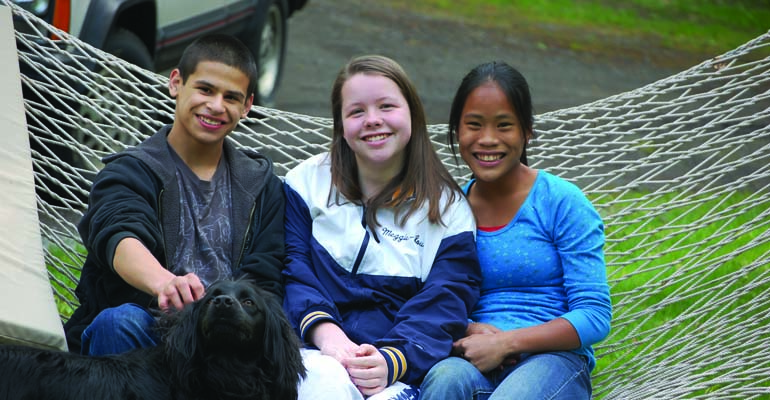I wanted to hiss, “It’s none of your business!” to the stranger who probed, “Your daughter doesn’t look like you. She must look like your husband. Does she? Does she?”
My daughter, Meghann, now almost 16, was barely a toddler, and I had had little practice at responding to the ill-advised comments that all adoptive families face. Gritting my teeth, I saved my frustration to vent on the following Friday — the next time I’d meet with my adoptive-moms support group.
Group Dynamics
The group began when two adoptive mothers were introduced to each other by a mutual friend, and its membership grew by word-of-mouth. A friend, who had adopted her sons from Colombia and the U.S., convinced me to attend when Meghann was a few months old. At the initial meeting, I met women whose kids were born in Russia, Korea, China, Romania, and Guatemala, as well as several fellow domestic adopters. At first, our only connections were our children, born in our hearts, not from our wombs.
I admit that I attended my first meeting reluctantly, but my skepticism subsided as I realized that, while ostensibly formed to help our kids, the group supported us all. This was reinforced on that Friday night, when I divulged my story of the run-in with the nosy stranger. As I expected, the moms gave me a chorus of encouragement — as well as the answer I’ve used ever since: “She looks just like herself.”
Our group helps us find language for the next interaction with strangers or adoption conversation with our kids, lets us know that what we’re going through is normal, and affirms our joy in parenting. In the beginning, we used to meet in each other’s homes, breaking the ice with cheese and crackers and a bottle of wine. Sometimes, the agenda included a discussion of an article or a book, such as Patricia Irwin Johnston’s Perspectives on a Grafted Tree. We brought in our favorite adoption-themed children’s books and watched films with adoption storylines. Occasionally, we hosted speakers — a family counselor with a specialty in adoption, a local woman who had recently reunited with her birth mother. Many of the meetings were informal. A member would raise a discussion point, and conversation flowed from there.
My husband, Tim, met the group’s other dads at hikes, bowling nights, and Halloween parties. Gatherings at the playground and summer trips to the beach let my daughter spend time with the other kids. Our children knew that we had come together because of the way our families were formed. They were too young to talk about adoption when they first met, but they all grew up in the company of other adoptees. From the beginning, they were part of a larger group.
A Lasting Bond
Now many of our kids are approaching college age. Although our Halloween parties are a thing of the past, our families still enjoy a mid-winter pot-luck, and we’re organizing a group softball game this summer. Hectic lives mean we don’t meet as often as we used to, but the bond remains strong. I walk regularly with moms from my group. And when I was laid off, after many years with the same company, friends I’d made through the group stepped up, inviting me for lunch and conversation to help me absorb the loss. As our children mature, we do, too. Adoption still comes up in conversation, but so do driver’s licenses, curfews, college applications, and other standard mother-of-teenager topics.
Truth be told, this group has sustained me since I uneasily attended that first meeting, years ago, but I never valued our connection more than I did recently. Meghann, a flute player in her high-school band, overheard an unfriendly interaction one day during practice. As a closing insult, one of the offenders tossed out the ostensibly derogatory, “You must be adopted.”
As my daughter explains it, she locked eyes with a fellow band member, whose mother is in my moms group. Without speaking, they stood next to each other, folded their arms, and raised their eyebrows at the classmate who had used “the ‘a’ word.” Confused, he looked at them, asking, “What?” They chastised him together, “We were both adopted.”
When Meghann told me that story, I offered a silent thanks to my group. Because of the relationships formed from our long affiliation, my daughter wasn’t required to fight the prejudice inherent in that comment by herself. She was also confident enough to engage in the campaign willingly, stating her position with pride — while standing side-by-side with someone like her.



